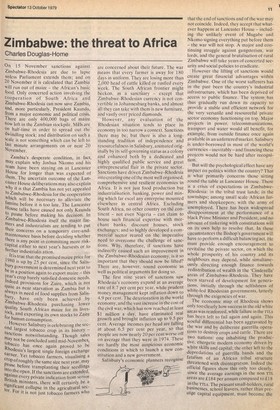Zimbabwe: the threat to Africa
Charles Douglas-Home
On. 15 November sanctions against Zimbabwe-Rhodesia are due to lapse unless Parliament extends them; and on 20 November it is calculated that Zambia Will run out of maize — the African's basic food. Only concerted action involving the cooperation of South Africa and Zimbabwe-Rhodesia can now save Zambia, and, more particularly, President Kaunda, from a major economic and political crisis. There are only 400,000 bags of maize now left in the Zambian stockpile. Mills are on half-time in order to spread out the dwindling stock: and distribution on such a scale is not something which can be left to last minute arrangements on or near 20 November.
Zambia's desperate condition, in fact, may explain why Joshua Nkomo and his team have been staying on at Lancaster House for longer than was expected of them. The uncertain outcome of the Lancaster House deliberations may also explain Why it is that Zambia has not yet appealed to Zimbabwe-Rhodesia for the cooperation Which will be necessary to alleviate the famine before it is too late. The Lancaster House talks have caused not only Kaunda to pause before making his decision. In Zimbabwe-Rhodesia itself the major farmers and industrialists are tending to put their concerns on a temporary care-andmaintenance basis before deciding whether there is any point in committing more riskcapital either to next year's harvests or to further industrial is ation. It is true that the promised maize price for 1980 is up by 25 per cent, since the Salisbury government is determined next year to be in a position again to export maize — this Year's crop barely satisfied domestic needs. Indeed provisions for Zaire, which is not quite as near starvation as Zambia but is always in need of food supplies from SalisburY, have only been achieved by Zimbabwe-Rhodesia purchasing lower quality South African maize for its lives lock, and exporting its own stocks to Zaire for human consumption. However Salisbury is celebrating the second largest tobacco crop in its history — sanctions notwithstanding. Though sales may not be concluded until mid-Novembers, tobacco has once again proved to be Rhodesia's largest single foreign exchange earner. Yet tobacco farmers, visualising a crop of roughly the same size next year, may Pause before transplanting their seedlings into the open. If the sanctions are extended, a_gainst every private indication from senior British ministers, there will certainly be a significant collapse in the agricultural sector, For it is not just tobacco farmers who are concerned about their future. The war means that every farmer is away for 180 days in uniform. They are losing more than 2,000 head of cattle killed or rustled every week. The South African frontier might beckon, as a sanctUary — except that Zimbabwe-Rhodesian currency is not convertible in Johannesburg banks, and almost all they can take with them is new furniture, and vastly over priced diamonds.
However, any evaluation of the Rhodesian situation tends to place its economy in too narrow a context. Sanctions there may be; but there is also a longstanding tradition of independence and resourcefulness in Salisbury, animated originally by its self-governing status as a colony and enhanced both by a dedicated and highly qualified public service and great entrepreneurial flair in the private sector. Sanctions have driven Zimbabwe-Rhodesia into creating one of the most well organised, comprehensive and resilient economies in Africa. It is not just food production but industrialisation, banking, power and mining which far excel any enterprise mounted elsewhere in central Africa. Excluding South Africa, no other country on the continent — not even Nigeria — can claim to house such financial expertise with merchant banks, discount houses, stock exchanges; and so highly developed a commercial sector reared on the imperative need to overcome the challenge of sanctions. Why, ,therefore, if sanctions have indirectly caused such an improvement in the Zimbabwc-Rhodesian economy, is it so important that they should now be lifted? There are, however, sound economic as well as political arguments for doing so.
The first nine years of sanctions saw Rhodesia's economy expand at an average rate of 8.7 per cent per year, while prudent money management kept inflation down to 4.9 per cent. The deterioration in the world economy, and the vast increase in the cost of the civil war, which has now reached at least $1 million a day, have eliminated real growth and brought inflation up to 9.5 per cent. Average incomes per head are falling at about 6.5 per cent per year, so that people are now nearly 20 per cent worse off on average than they were in 1974. These are hardly the most auspicious economic conditions in which to launch a new constitution and a new government. Salisbury's economic planners recognise that the end of sanctions and of the war may not coincide. Indeed, they accept that whatever happens at Lancaster House — including the unlikely event of Mugabe and Nkomo signing everything put before them — the war will not stop. A major and continuing struggle against gangsterism, war lords, and the general brutalisation of rural Zimbabwe will take years of concerted security and social policies to eradicate.
However the lifting of sanctions would create great financial advantages within Zimbabwe, One of the worst sufferers has in the past been the country's industrial infrastructure, which has been deprived of access to public finance. The system , has thus gradually run down its capacity to provide a stable and efficient network for the very versatile and resourceful private sector economy functioning on top. Major projects in power, telecommunications, transport and water would all benefit, for example, from outside finance once again available in an unfetteredmarket. Salisbury is under-borrowed in most of the world's currencies— inevitably —and financing these projects would not be hard after recognition.
But will the psychological effect have any impact on politics within the country? That is what primarily concerns those sitting round the table at Lancaster House. There is a crisis of expectations in ZimbabweRhodesia: in the tribal trust lands; in the townships; among small scale African farmers and shopkeepers; with the army of unemployed. There has been widespread disappointment at the performance of a black Prime Minister and President, and no amount of tinkering with constitutions will on its own help to resolve that. In these circumstances the Bishop's government will have to perform a difficult balancing act. He must provide enough encouragement to revitalise the private sector, on which the whole prosperity of his country and its neighbours may depend, while simultaneously directing enough finance towards redistribution of wealth in the 'Cinderella' areas of Zimbabwe-Rhodesia. They have been starved of development for generations, initially through the selfishness of white-led Rhodesian governments, latterly through thc exigencies of war. The economic map of Rhodesia shows only too clearly how success in the old white areas was reinforced, while failure in the Tits has been left to fail again and again. This woeful differential has been aggravated by the war and by deliberate guerrilla operations to destroy crops and cattle. There are two nations: one inhabiting the productive, ehergetic modern economy driven by white skills and capital; the other left to the depredations of guerrilla bands and the fatalism of an African tribal structure threatened with disintegration. Indeed the official figures show this only too clearly, since the average earnings in the non TIT areas are £184 per annum compared to £18 in the rms. The peasant small-holders, rural businesses, school leavers, rather than prestige capital equipment, must become the new economic priorities of the Salisbury treasury.
The lifting of sanctions, even without the end of the war, would have marked benefits, and not just for tobacco or chrome. Foreign trade under .sanctions already amounts to 40 per cent of Zimbabwe-Rhodesia's gross domestic product. Without sanctions, but with prudent import controls, the high transitional cost of getting Rhodesian illegal exports to their secret markets would be largely eliminated. And the politics of this trade would presumably then enable Zambia once again to buy food from her neighbour instead of paying 50 per cent more for it elsewhere. Without sanctions, the trade routes of central Africa would fall more naturally into their traditional pattern. The distortions of sanctions have meant that landlocked Zambia is near to ruin, Mozambique is pathetically reliant on South Africa and cut off from eastern neighbours; and Zaire has to continue trading under expensive pseudonyms.
Indeed the economic future of central Africa can only be determined when the economic future of Zimbabwe-Rhodesia is itself stabilised. Several things are now clear. Whatever the settlement reached at Lancaster House, the whole area of central Africa — Zambia, Zaire, Malawi, Botswana and Zimbabwe-Rhodesia itself will suffer if the Zimbabwe white-led private sector in agriculture and industry is maimed or stunted as a result of political mishandling. In addition, the future of southern and central Africa, and in particular the developments in South Africa, will take a good or a bad turn according to the trend which will be followed by ZimbabweRhodesia and its neighbours. The whole logistical framework of that part of Africa demands a stable, prosperous Zimbabwe not just feeding her neighbours and operating as the industrial and financial powerhouse for the area, but also providing an alternative focus to the economically magnetic though politically repellent power of Pretoria. Such an alternative would not only relieve South Africa's black neighbours to the north of the fear that they were being inevitably sucked into a South African 'co-prosperity' sphere — the so called 'constellation of states' — which was not to their liking politically; it would also relieve Pretoria of some of the strain, and enable Mr Botha to point to the successful experiment to the north, and strengthen his attempts to secure some kind of peaceful change in his so nearly benighted country. It is not too late.



































 Previous page
Previous page